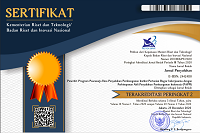KEPUASAN KERJA KADER POSYANDU DI DESA CIHERANG KECAMATAN DRAMAGA
Abstract
Posyandu is one of the community participation approach in health sector that is managed by cadres, with the main problem arises is the declining number of visits of mothers of infants and toddlers.The aimed of this research were to analyze the level of job satisfaction of posyandu cadres, and to analyze the factors that influence job satisfaction.Research conducted in Ciherang village with 30 samples that was selected using random sampling. The result showed that most of cadre’s job satisfaction can be categorized high, despite the visit of mother and toddlers tended to decline. It means that the decline was more due to the factor of the target or the mothers themselves, not the factor of posyandu organizers. The higher the incentives received by the cadres and the more participation of cadres in training influenced significantly for the improving of cadre’s job satisfaction. In term of the strategies to increase the job satisfaction, in general, all the items associated with the work of posyandu cadres should be retained or categorized low priority, in other words there is no necessary to increase the job satisfaction posyandu cadres.
Keywords : Posyandu, Job Satisfaction, Cadre
Downloads
Authors who publish with this journal agree to the following terms:
- Authors retain copyright and grant the journal right of first publication with the work simultaneously licensed under a

This work is licensed under a Creative Commons Attribution 4.0 International License that allows others to share the work with an acknowledgement of the work's authorship and initial publication in this journal. - Authors are able to enter into separate, additional contractual arrangements for the non-exclusive distribution of the journal's published version of the work (e.g., post it to an institutional repository or publish it in a book), with an acknowledgement of its initial publication in this journal.
- Authors are permitted and encouraged to post their work online (e.g., in institutional repositories or on their website) prior to and during the submission process, as it can lead to productive exchanges, as well as earlier and greater citation of published work (See The Effect of Open Access).















